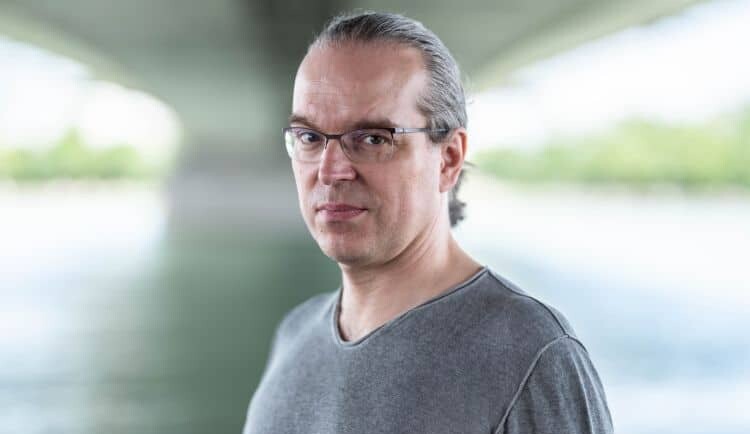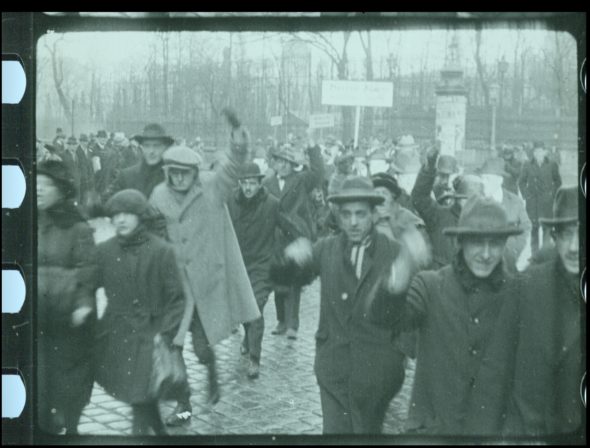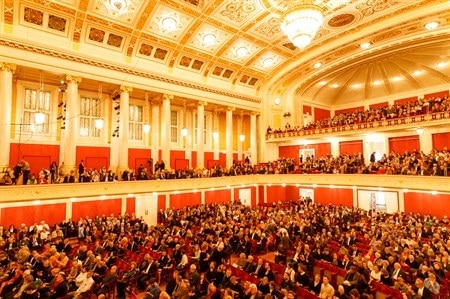
WIEN MODERN has been developing rapidly under the direction of BERNHARD GÜNTHER. Big ideas being performed and staged in the outer districts as well as the classic inner city temples of fine art. Stefan Niederwieser spoke with BERNHARD GÜNTHER, who managed this with a lot of self-confidence by tapping foundation funds and strengthening feedback.
Have you seen the film “Die Stadt ohne Juden” before?
Bernhard Günther: I knew the film but not the music, or at least only the score. The piece is ambiguous and dazzling, an opening of the musical space. Olga Neuwirth approaches it not only with a certain irony, but also with anger.

Olga Neuwirth often expresses herself politically, but not always so pointedly in her works. That could be different here.
Bernhard Günther: “Die Stadt ohne Juden ” and “The Outcast” are quite political, both pieces are statements of time with a historical depth. Hugo Bettauer wrote his visionary novel in the 1920s and gave it the subtitle “The novel of the day after tomorrow”. He plays through the expulsion of the Jews and their consequences in his thoughts. Olga Neuwirth knew the novel and the film version, yet she hesitated for a long time to accept the commission because she was aware of the enormous responsibility. Austria has always been a breeding ground for xenophobia, as early as the 1880s, when Karl Lueger campaigned with anti-Semitism, and you can still find it today. Olga Neuwirth reacted to this, also in music.
And “The Outcast”?
Bernhard Günther: The “Hommage an Herman Melville” (Hommage to Herman Melville) is more topical than you might think. The family of Melville, the author of “Moby Dick”, became impoverished in the stock market crash on the infamous Black Friday of 1869, human greed and greed have always occupied him. Already in 1851 he wrote his absolutely visionary novel – journalist Klaus Nüchtern once said that if you had read “Moby Dick”, you wouldn’t find “Ulysses” so impressive anymore. During his lifetime Melville was misunderstood, in the end he died impoverished and lonely. All this inspired Olga Neuwirth. She puts Melville on stage as an opera character, next to his characters. On the one hand we experience a wild action story with a furious downfall, on the other hand the characters revolt against the one who invented them. The gender roles change, a man is in a female role and plays a man in the opera, the narrator and only survivor Ishmael becomes Ishmaela with Olga Neuwirth. It’s about abuse of power and greed.

What is to say about Gottfried von Einem that has not yet been said?
Bernhard Günther: “Der Prozess” is very brittle but also very radical and very beautiful. We find an artistic reaction to the McCarthy era in it. Around 1950 there was artistic protest against this radical policy of exclusion. Even if the piece is reserved, one sees the harbingers of socio-critical thinking. Society in Austria in the post-war period was still very authoritarian, musically conservative, the underground actually took place in the basement, slowly developing into an aesthetic liberation. As a relatively young composer, Gottfried von Einem was already on the board of directors of the Salzburger Festspiele, and the premiere was like a bomb.
In preparation for Wien Modern, should one familiarise oneself with Thomas Hobbes, who philosophically formulated the ambivalence of security – this year’s leitmotif – in “Leviathan”?
Bernhard Günther: Our catalogue was very philosophical last year, you can and should simply go to a concert this year without knowing how to spell “philosophy” – but it doesn’t hurt either. “Security” attracts me because it is an eternal topic. Of course, since 9/11 it has got a very special topicality, it has almost been fetishised. Art has always been a counter-image to this. We want to make this sensually perceptible. Nobody wants to go to a concert that plays it safe, that would be terribly boring. It’s electrifying when one notices that something is being risked.
Under the artistic director Berno Odo Polzer there was a lot of electronic avant-garde music at the festival, which is usually not performed in concert halls. During your time in Luxembourg, you were also responsible for such additions. But this is hardly visible in the programme of Wien Modern.
Bernhard Günther: Electronics have long been integrated into the inventory of instruments. There are such pieces again and again; with “duo-mono-lith”, for example, there will be a highly technological project in which iris scanners control the live electronics. The mix will be different from year to year. I don’t have to tick off a list à la “Do we have electronics, sound installations, interactive performances, etc.?
Now these forms of music have a fixed place at the Donaufestival or the Wiener Festwochen. To what extent do they coordinate?
Bernhard Günther: There is an exchange with the filmfestival Viennale and with many institutions. The Wiener Festwochen were not very intensive, partly because the festivals take place so far apart. Vienna can certainly accommodate some festivals dedicated to contemporary art. The free music scene in Vienna is very large and creative, but by no means as visible as it could be.
What could not be implemented in three years?
Bernhard Günther: The field in which a concert ends and other formats begin grows from year to year. Now a festival like Wien Modern has a limited production logic. When you move beyond it, things quickly become very complex. “The Outcast” actually bursts all possibilities – for a single performance the venue Konzerthaus stands still for three days. In an opera house it’s not unusual, in a concert hall it’s a lot. I am very proud that we can do that this year. My goal for Wien Modern is to come there and be able to show this unbelievably inspiring diversity even better. Contemporary music is also very bad in terms of supporting youth work, so we want and need to do much more. I am incredibly happy that the Art Mentor Foundation Lucerne has given us funds for three years to take better care of it. This is the largest private grant Wien Modern has ever received. We have a loyal regular audience that I love, but we also have to think about the future.
Wouldn’t it be a huge project to make Wien Modern more feminine?
Bernhard Günther: I think there has been a refreshing amount of progress. This year, for example, there will be a new female composer’s prize, which has been announced throughout Austria. I got to know a few female composers myself who I didn’t know. Today, no one can claim that there are far fewer women composers. Many female composers are in their early years at the universities. Last year we had between forty and fifty percent female composers in our programme for the new pieces. My youth work was the almost 1,300-page “Lexikon zeitgenössischer Musik aus Österreich” (Encyclopaedia of Contemporary Music from Austria). At the time, we came up with seven percent female composers, although we sometimes turned a blind eye to the categories for inclusion in the encyclopaedia. This year the situation has opened up very much. One no longer has to prove oneself in the classical forms, but can approach new music from the media, from performance or the field of conceptual theatre.

The number of visitors has developed very positively.
Bernhard Günther: We have never before sold as many tickets as this year. In my first year we had roughly 17,000 visitors with tickets and an additional 10,000 in free events with a very difficult, dark programme. In the second year we even sold several hundred more tickets, but had only 3,000 visitors in free events, because we produced less for free for budgetary reasons. This year we’re issuing over 25,000 tickets and we’re also offering some for free. Before my time, Wien Modern had a total of 11,000 visitors.
There are more than a hundred programme items this year, almost twice as many as under your predecessor. But the team didn’t get any bigger. Does that effect the substance?
Bernhard Günther: The team of Wien Modern is fantastic. When I hit a budget low here three years ago, it was important not to act defensively. The festival needs visibility and productions that you can’t see in this city otherwise. I deliberately decided against shrinking the festival, even if, for example, in Strasbourg you have twice as much money for new music in half the time. What takes place musically in Vienna is extremely diverse and exciting, that should be shown.
To what extent is the Wiener Konzerthaus a help?

Bernhard Günther: The Wiener Konzerthaus is traditionally the festival’s largest and most important partner and an astonishing ticket sales machine. It is loved by the audience. When we sell a production with the Konzerthaus, it makes a huge difference. If we had to build up the areas in which we can use synergies – the ticket and service centre, a part of the event technology and the bookkeeping – from our own resources, the festival would be five times as expensive. The Wiener Konzerthaus is what makes the festival possible in the first place. Nevertheless, it is important that Wien Modern visibly goes beyond the Konzerthaus and its everyday life.
Where did you study?
Bernhard Günther: I am a college drop-out, initially studied cello in Lübeck, later musicology in Vienna, but never wrote my final thesis, because I already worked full-time at the newly founded mica – music austria and on the “Lexikon zeitgenössischer Musik aus Österreichischer”.
Is contemporary classical music too hard to play?
Bernhard Günther: That could be the case if the younger generation of musicians were not so fantastic. The situation has changed completely. Luciano Berio wrote the 14 solo pieces that will be heard as part of the “Casino Cage” project for the best virtuosos of his time. Today, students play it, they practice it for months, but they play it, and they play very well. A part of contemporary music operates with this unplayability, pieces like “Kottos” by Iannis Xenakis, “Time and Motion Study” by Brian Ferneyhough, “Cello Song Variations” by Christian Wolff and the “Freeman Etudes” by John Cage – all to be heard this year in the “Solo Challenge” – are incredibly difficult. We have asked musicians to play their personal challenge. The audience notices with such pieces that someone is just going to the limits of what is possible. Sometimes it sounds far away from what many people generally think of as music, but the energy leaps over. On the other hand, there are also compositions in New Music that children can play, which can be heard, for example, in the cooperation “Junge Musik” with the IGNM and the Musikschule Wien (Music School Vienna), there are completely different aesthetic approaches. However, in Vienna many people are super on their instruments. You shouldn’t underestimate the audience or the musicians.
For festivals, the expectation to integrate places and people in the periphery is quite difficult to fulfil.
Bernhard Günther: That’s absolutely difficult. That’s why I’m careful with new venues. This year we are in ten districts and are working on site with very small-scale communication if possible, for example last year in the Wohnparkkirche in Alterlaa (a church in Vienna´s outer districts Alterlaa), where a large number of local audiences actually came to the concert. If you do it right, it’s a lot of effort. And there are infinite possibilities to ruin projects in new venues: Some are unfortunately just like spaceships that end up in a suburb and have no effect there.
The plan to obtain foundation funds has apparently been successful. Now it could be read that there is no financial safety net for this year.
Bernhard Günther: The Ernst von Siemens Musikstiftung (Ernst von Siemens Music Foundation) has been supporting us for many years, to my knowledge this year as high as never before. The Art Mentor Foundation Lucerne has joined us. Interestingly, both foundations are abroad. In Switzerland, you can earn a lot more money through a different foundation landscape. For the festival ZeitRäume Basel 2017 we contacted about 200 foundations. In Austria I wouldn’t even know who I should write so many applications to. Due to the great success of 2016, we received a three-year contract from the federal government with a slight upward adjustment. In 2016 funding from the city was reduced at the last minute, but then I also got a three-year contract. This year, the City of Vienna unexpectedly corrected the cut again, through the project funding for Olga Neuwirth we are now at least back to the level of 2015.
The funding rate has thus fallen from around 80 per cent to around 60 per cent.
Bernhard Günther: Yes, approximately, we will receive 825,000 euros of public money in a budget of around 1.4 million this year.
Is Wien Modern imaginable under red-blue?
Bernhard Günther: Vienna is inconceivable without Wien Modern.
By Stefan Niederwieser – translated by Dave Dempsey and slightly shortened by Austrian Music Export.
